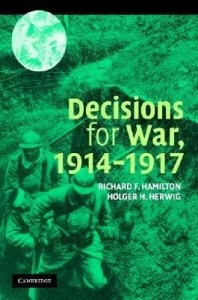Â

In Decisions for War, 1914-1917, Richard Hamilton and Holger Herwig present a new thesis for the origins of World War I. They argue that in all the belligerent countries the decision for war was made by a one person or at most a small group of individuals regardless of the type of government. Given the wealth of material written about the origins of the First World War it seems incredible to me that this possibility has, if not been overlooked in all previous scholarship, then certainly ignored, as the authors claim[1]. While Hamilton and Herwig do not entirely discount that other factors than pure national self-interest on the part of the leaders played a role in the decision for war, they do contend that this was the overriding concern in most if not all of the wars belligerents.
           I found the book to be a fairly easy to read, the writing style was not as dry as might be expected given the topic of discussion. Even though I do not necessarily agree with the authors, the book was fun and captivating to read. They write with a style similar to what I try to achieve in my own writing. It is written such that it is simultaneously engaging, factual, and descriptive, just a good read. I do not have to agree with a book to enjoy it, and the authors certainly made reading this enjoyable. It was laid out well and the chapters flowed in a logical progression, discussing each country in the order in which it declared war.
